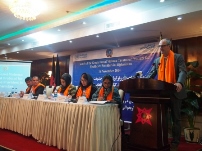 WHO Country Representative Dr Rik Peeperkorn said that gender-based violence had profound implications for health but was often ignoredKabul, 16 November 2014 – Today the Ministry of Public Health of Afghanistan and the World Health Organization, with the support of UN Women, launched Afghanistan’s first-ever gender-based violence (GBV) treatment protocol for health care providers at an event held in Kabul.
WHO Country Representative Dr Rik Peeperkorn said that gender-based violence had profound implications for health but was often ignoredKabul, 16 November 2014 – Today the Ministry of Public Health of Afghanistan and the World Health Organization, with the support of UN Women, launched Afghanistan’s first-ever gender-based violence (GBV) treatment protocol for health care providers at an event held in Kabul.
“This protocol is a much-needed intervention for strengthening health care response to gender-based violence in our country and ensuring that GBV survivors receive the kind of care and treatment they need,” said Deputy Minister of Public Health Dr Najia Tariq.
“Although the links between health and GBV are too often ignored, health care providers have a major role to play in GBV response. The protocol is a major step forward in building the capacity of the health sector to manage GBV cases effectively.”
The protocol is based on WHO global guidelines launched in 2013 and Afghanistan is the first country to develop the guidelines to a country-specific protocol. The protocol contains detailed guidelines on how health care professionals can provide quality care for GBV survivors, including sections on survivor-centred care, managing rape cases, wounds and burns, and collecting medico-legal evidence. More than 6000 health care providers, including doctors, nurses and midwives, will be trained on GBV care around the country in the next five years.
“Gender-based violence, especially violence against women, is not only a severe human rights violation but also a serious public health problem in Afghanistan,” said Dr Rik Peeperkorn, WHO Country Representative. “GBV has many consequences on health, some hidden and some more obvious. It can cause a wide range of physical and mental as well as sexual and reproductive health problems.”
According to global estimates, more than one third of all women experience either intimate partner violence or non-partner sexual violence in their lifetime. Research in Afghanistan shows that more than 80% of women experience at least one form of domestic violence and over 60% of women experience multiple forms of violence. GBV includes sexual violence and rape, violence related to harmful traditional practices such as “honour” killings, child marriages and bad, the selling of women and girls to settle disputes. Although men and boys can also be victims of GBV, women are particularly affected.
“People who have been assaulted, abused and violated need proper care and support. Health care providers are often the first contacts GBV survivors speak to, making it absolutely essential for them to be able to recognize signs of GBV and respond safely and appropriately. The health sector is also a crucial gateway to other services survivors might need, such as social welfare or mental health,” said Dr Avni Amin, Technical Officer at the World Health Organization in Geneva.
Calling the protocol “an essential development in the history of Afghanistan”, UN Women Country Representative Elzira K. Sagynbaeva said: “We are pleased to partner with the Ministry of Public Health and WHO on this crucial initiative and urge donors to extend their support for the project’s implementation. Full implementation, including training of health care personnel, requires resources. UN Women stands ready to work with partners for joint resource mobilization as part of our larger efforts on ending GBV.”
Violence against women is an urgent public health priority. In the 67th World Health Assembly in May this year governments from around the world adopted a historic resolution on violence against women. The resolution calls on all WHO member states to strengthen the role of their health systems in addressing GBV by enhancing capacities to respond to such violence and providing effective and appropriate services to survivors.
Link to the GBV Protocol:
Gender-based Violence Treatment Protocol for Healthcare Providers in Afghanistan








